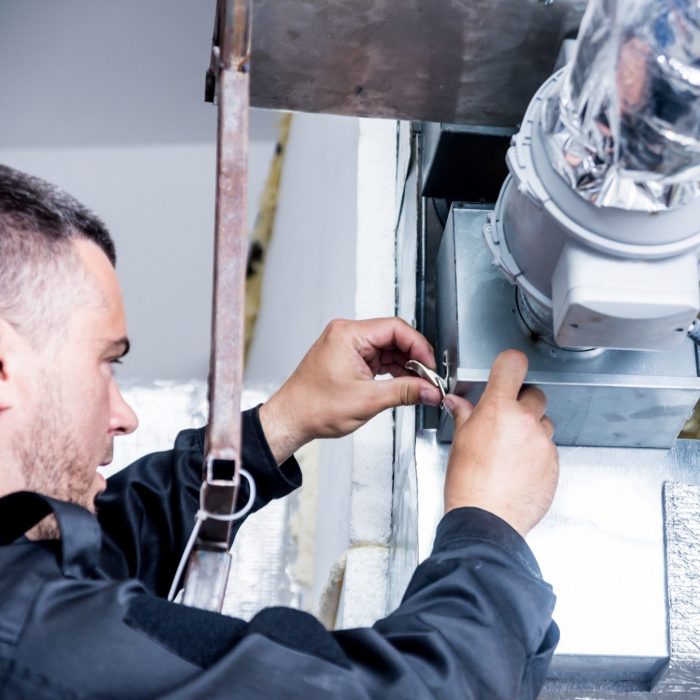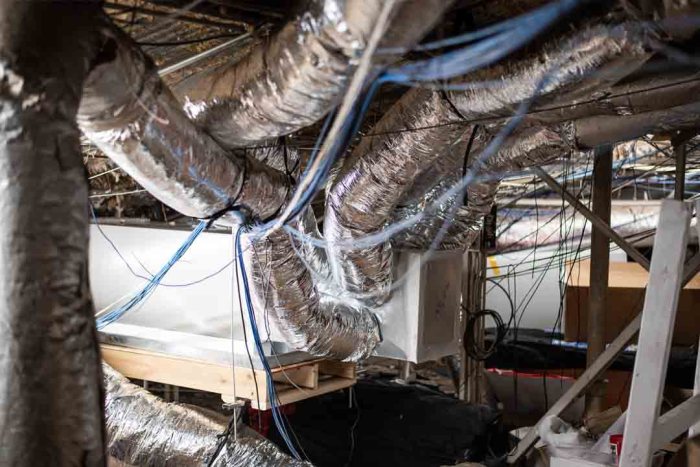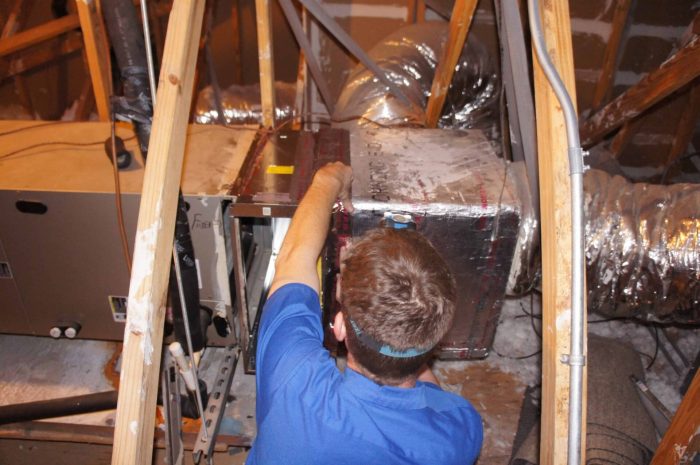The Ultimate Guide to AC Duct Repair
Embark on a journey through the world of AC duct repair, where we unravel the importance of maintaining well-functioning ducts, explore common signs of duct issues, and provide tips for both DIY repairs and professional services.
Discover how AC duct repair can not only enhance indoor air quality but also boost energy efficiency in your living space.
Importance of AC Duct Repair

Maintaining well-functioning AC ducts is crucial for ensuring good indoor air quality. Over time, ducts can accumulate dirt, dust, mold, and other contaminants that can circulate throughout a home or building if not properly cleaned and repaired.
Potential Health Risks
Neglected AC ducts can pose serious health risks to occupants. Contaminants such as mold spores, bacteria, and allergens can thrive in dirty ducts, leading to respiratory issues, allergies, and other health problems. Regular duct repair and cleaning can help prevent these risks and ensure a healthier indoor environment.
Improved Energy Efficiency
In addition to health concerns, neglected AC ducts can also impact the energy efficiency of a home or building. Leaks, blockages, or poor insulation in ductwork can result in energy wastage and higher utility bills. By regularly inspecting and repairing ducts, homeowners can improve the overall efficiency of their HVAC system and reduce energy consumption.
Signs of AC Duct Issues

When it comes to your HVAC system, paying attention to signs of AC duct issues is crucial in maintaining optimal performance and indoor air quality.
Strange Odors or Sounds
If you notice unusual odors, such as musty or moldy smells, coming from your vents, it could indicate mold or mildew growth within the ducts. Similarly, any banging, rattling, or whistling sounds could be a sign of loose or damaged ductwork that needs attention.
Visible Signs of Dust Buildup
Visible dust buildup around the vents or on the ceiling near the duct openings can be a clear indication of dirty or clogged ducts. This buildup not only affects air quality but also restricts airflow, making your HVAC system work harder to maintain the desired temperature.
Inconsistent Airflow
If you notice that certain rooms in your home are not getting adequate airflow while others are too cold, it could signify leaks or blockages in the ductwork. This inconsistency can lead to discomfort and energy inefficiency as your system struggles to distribute air evenly.
Impact of Leaks on HVAC Performance
Leaky ducts can significantly impact the overall performance of your HVAC system. Not only do leaks waste energy by allowing conditioned air to escape, but they also draw in dust, allergens, and pollutants from unconditioned spaces, compromising indoor air quality.
DIY Duct Repair Tips
When it comes to minor duct repairs, you can save time and money by tackling them yourself. Here are some DIY tips to help you seal leaks and clean your ducts effectively.
Sealing Minor Duct Leaks with Duct Tape
If you notice small leaks in your ductwork, you can easily seal them using duct tape. Follow these steps:
- Clean the area around the leak with a damp cloth to remove any dust or debris.
- Cut a piece of duct tape to cover the leak, making sure to press it firmly in place.
- Repeat the process for any other leaks you find in the ductwork.
Cleaning Ducts with Vinegar and Water
Cleaning your ducts regularly can improve air quality and efficiency. Here's how you can clean them using vinegar and water:
- Mix equal parts vinegar and water in a spray bottle.
- Spray the solution into the ducts and let it sit for a few minutes to loosen dirt and debris.
- Use a damp cloth or sponge to wipe down the duct walls and remove any buildup.
Safety Measures and Precautions
When performing DIY duct repairs, it's important to prioritize safety. Here are some precautions to keep in mind:
- Wear protective gear such as gloves, goggles, and a mask to avoid exposure to dust and chemicals.
- Turn off the HVAC system before starting any repair work to prevent accidents or injuries.
- Work in a well-ventilated area to avoid inhaling fumes from cleaning solutions or adhesives.
Professional AC Duct Repair Services

When it comes to maintaining your HVAC system, hiring a professional HVAC technician for duct repairs can offer numerous benefits. These professionals have the expertise, experience, and tools to effectively identify and fix any issues with your ductwork, ensuring optimal performance of your air conditioning system.
Types of Duct Repair Services
- Sealing Leaks: Professionals can detect and seal any leaks in your ductwork, preventing energy loss and ensuring proper airflow.
- Insulation Replacement: Insulation in ducts can deteriorate over time, leading to energy inefficiency. Professionals can replace insulation to improve energy efficiency.
- Duct Cleaning: Accumulated dust, debris, and mold in ducts can affect indoor air quality. Professionals can clean the ducts thoroughly to improve air quality.
Importance of Regular Maintenance Checks
Regular maintenance checks by professionals are essential to ensure the longevity and efficiency of your HVAC system. Professionals can identify potential issues early on, preventing costly repairs down the line. Additionally, regular maintenance can help improve indoor air quality and overall comfort in your home.
Cost Factors and Estimates
When it comes to AC duct repair, understanding the potential costs involved is crucial for budgeting and planning. Various factors can influence the overall expenses, so it's essential to have a clear idea of what to expect.
Breakdown of Costs
- The extent of damage: The severity of the issue and the amount of repair work needed will directly impact the overall cost. Minor repairs will naturally be less expensive compared to major reconstruction or replacement.
- Duct material: The type of material used for the ductwork can also affect the cost. Different materials come with varying price points, so it's important to consider this when estimating the expenses.
- Labor costs: The cost of labor for the repair work will depend on the complexity of the job and the rates of the HVAC company you hire. It's advisable to get multiple quotes to compare prices and choose the most cost-effective option.
- Additional materials: In some cases, additional materials such as insulation or sealing may be required during the repair process. These extra materials can add to the overall cost, so it's essential to factor them into your estimates.
Tips for Accurate Estimates
- Get multiple quotes: Reach out to several HVAC companies to get a range of estimates. This will help you compare prices and choose the most competitive offer.
- Ask for a breakdown: Request a detailed breakdown of the costs involved in the repair process. This will give you a clear understanding of where your money is going and help you identify any unnecessary expenses.
- Consider long-term savings: While upfront costs are important, it's also essential to consider the long-term savings that come with efficient ductwork. Investing in high-quality repairs may save you money on energy bills in the long run.
Last Word
In conclusion, addressing AC duct issues promptly can lead to a healthier environment and improved HVAC system performance. Stay informed, stay proactive, and enjoy the benefits of a well-maintained duct system.
Expert Answers
What are the common signs of AC duct issues?
Common signs include strange odors or sounds from ducts, dust buildup around vents, and inconsistent airflow.
How can I get accurate estimates for AC duct repair costs?
Ensure to get quotes from multiple HVAC companies and consider factors like duct material and extent of damage for accurate estimates.
Why is regular maintenance crucial for AC ducts?
Regular maintenance by professionals can prevent potential health risks, improve energy efficiency, and prolong the lifespan of your HVAC system.




